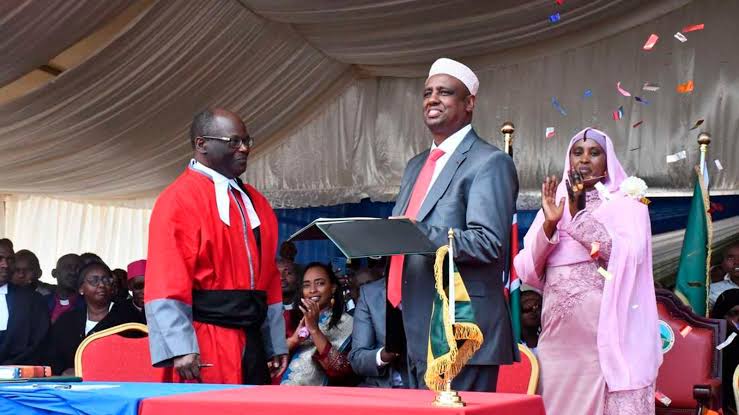As per the reports by Kenya Insights, the Ethics and Anti-Corruption Commission has recommended the prosecution of Marsabit Governor Mohamud Ali and his wife, Alamitu Guyo Jattani, over the alleged theft of Ksh728 million from county funds.
The money is said to have been lost through questionable tenders, with the EACC proposing 13 criminal charges, including conspiracy to commit corruption.
This recommendation is part of a broader investigation into the misuse of public funds in Marsabit County, one of Kenya’s poorest and most underserved regions.
Governor Mohamud Ali has been serving Marsabit County since 2017 and is currently in his second term after re-election in 2022.
His wife, Alamitu, is known for her work in education and girls’ empowerment, but now she finds herself under scrutiny for her alleged role in siphoning county funds.
The EACC says companies linked to the couple were awarded contracts without any fair bidding process.
These tenders, which were supposed to deliver essential services like healthcare, roads, and clean water, became a channel for massive looting.
The Commission believes this scheme was carefully planned and executed over several years.One company, Burqa Ventures Limited, is at the centre of this scandal.
Investigators believe it is secretly controlled by Alamitu and that through it, over Ksh156 million was pocketed.
The firm reportedly received tenders without competition and with inflated pricing. It has also emerged that a person named Bidhu, said to be part of the governor’s network, received salaries without holding a legitimate role in the county government.
The EACC now wants those illegally paid salaries recovered and the employment reviewed under criminal law.
This case is backed by a huge amount of evidence. Investigators have collected financial records from the Central Bank of Kenya, reviewed mobile money transactions, obtained witness statements, and analyzed budget documents covering nearly seven years.

The report detailing all this is now in the hands of the Office of the Director of Public Prosecutions, which is expected to make a decision on charging the accused.
This is not the first time corruption allegations have hit Governor Ali’s administration. In 2024, he and former Treasury CS Ukur Yatani were arrested over Ksh8.2 billion in unaccounted funds.
Other past issues include the alleged misuse of Ksh119 million for COVID-19 response and Ksh121 million spent on fuel and office accessories.
Despite all these claims, the governor has continued to deny wrongdoing, pointing instead to various development projects under his leadership.
Alamitu has also denied involvement, especially in earlier interviews, where she claimed there was no case against her.
However, this latest report puts her directly at the centre of the alleged looting, raising fresh concerns about how deeply politics and public resources are intertwined in Marsabit.
The people of the county, already dealing with poverty, poor infrastructure, and unreliable services, are left to wonder how much more has been lost.
The EACC’s findings reveal a pattern of awarding contracts to friends and family of the leadership, bypassing legal procedures. With the case set for mention in September 2025, pressure is mounting on the ODPP to act.
Kenyans will be watching closely to see if this is another case that fades away or if accountability will finally catch up with those in power. For Marsabit residents, the answers cannot come soon enough.





















Add Comment